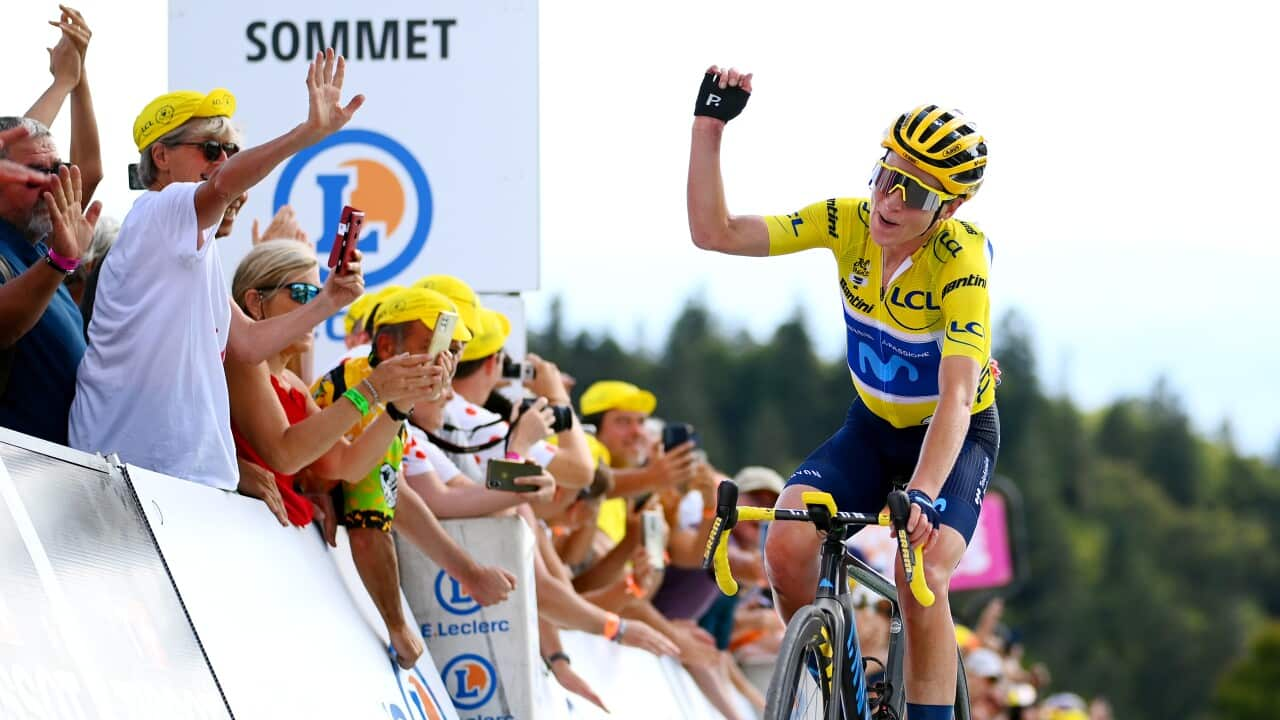Often, when a leading rider is held up due to an issue out of their control, race etiquette suggests that their competitors slow down the pace until the afflicted rider has caught up. Then, the racing continues: fast, fierce, furious - and, this one's under debate - fair.
We saw this in the Tour de France hommes, when Tadej Pogačar (UAE Team Emirates) crashed in Stage 18 at a decisive moment during a tricky descent. Jonas Vingegaard (Jumbo-Visma), wearing yellow at the time, slowed down for his rival in a moment of sportsmanship celebrated by many.
Vingegaard went on to all but secure the overall title that day, not just against the clock but for riding like a champion in spirit.
When van Vleuten got a puncture with 57 kilometres remaining in the Tour de France Femmes, SD-Worx and Trek-Segafredo did the opposite of slow down. They attacked.
“We went straight to the front and started riding,” Demi Vollering (SD-Worx) said.
“Also, Trek tried but, yeah, I think she was pretty fast back with a teammate's bike.”
Vollering started the day in second overall and was certainly motivated to make up, and exceed, the three-minute and 14-second deficit to first place.
“I tried something myself,” Vollering said of the attacking move, but reactions in the peloton revealed mixed feelings about the role of race etiquette in such a scenario.
“I tried to say to the girls in our group that we needed to go and needed to ride but they didn't really want to go.
“So yeah it was a bit sad, I think. But still I tried to put her under pressure so that she would have a hard time."
Van Vleuten borrowed teammate Arlenis Sierra’s bike and chased back on.
After catching back up to her main rivals, van Vleuten went to the front of the group and signalled with her hand for the team car. She would need to change bikes again to one that was set up for her. Signalling from the front of the group meant it would be impossible for riders to claim a repeat attack was because they simply 'hadn’t seen' that the race leader needed mechanical assistance.
Van Vleuten went on to win the stage and the overall title after surging up the final climb of the day, La Planche de Belles Filles.
Vollering finished the Tour in second overall and won the Queen of the Mountains classification, also an impressive feat.
“I tried everything today to beat her,” said Vollering of fellow Dutchwoman van Vleuten.
“I'm really happy that I could keep the polka-dot jersey. I knew that if I had the first sprint then I would just need to be second here, at least, to keep it. That was also a motivation of course."
Van Vleuten didn’t comment much on race etiquette or the controversial attack in her post-stage interview. "I had some struggles and I had some issues, but I was never really in trouble," she said.
"Also, today, I was not bored!"
Confident in her form on the bike, and her margin in the GC, she let her legs do the talking instead. She not only won the stage, but won it ahead of Vollering by 30 seconds, extending the time gap to second overall even further.
READ MORE

Van Vleuten wins the Tour de France
With short stages, a low total number of stages, and smaller team sizes compared to the men’s Tour; every second, pedal stroke, and tactical decision counted for a lot in the Tour de France Femmes. Add the attack-filled finale with a summit finish, and it appears the overall win would always come down to the final kilometres of the eight-day race.
In this way, Vollering’s bold move is understandable. No rules were broken, the time gap between competitors was unlikely to be made up on the final climb, and it would have taken a much more complicated mechanical for van Vleuten to lose her advantage in the race.
Plus, at its best, etiquette will always be a grey area. Racing is racing. It can never be expected that someone will go out of their way to enact the most honourable of options when there is so much at stake.
But that’s precisely why sporting gestures, like waiting for a rider when they're down, have so much impact.
In fact, it’s overcoming adversity – from gastroenteritis at the start of the Tour, to such strong, dominant riding in the final two stages – that makes van Vleuten’s overall victory even sweeter.
If Vollering won the overall title by a whisker, and did it by attacking her competitor when she was briefly forced off the bike, the question has to be asked: would it feel as great?










